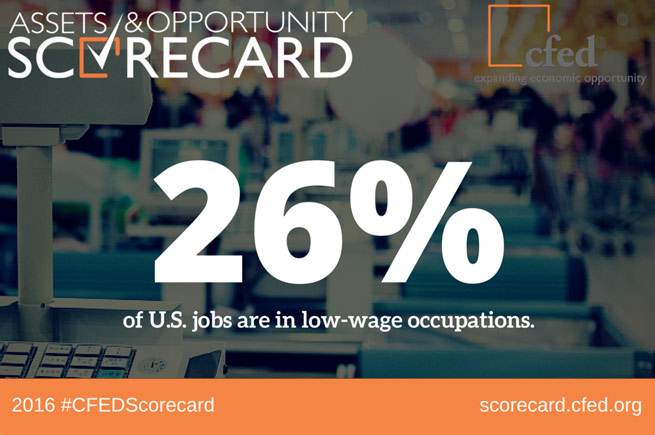Seven years since the official end of the Great Recession, many economists agree that America’s agonizingly slow financial recovery is finally complete.
But even though the national unemployment rate has remained steady at five percent in recent months, it’s clear to many families that the widespread economic prosperity of the past is just that—a thing of the past. As President Obama remarked in his final State of the Union address, the economy has been changing in profound ways, and the impact on household finances have been similarly profound.
If you’re looking to make the case for why this is happening—whether you’re advocating for better policies or advancing other work that creates good jobs and financial capability—start by checking out the new 2016 Assets & Opportunity Scorecard, issued by our partners at the Corporation for Enterprise Development (CFED).
Findings from the Scorecard reveal:
- There is a significant affordable rental housing shortage nationally and in many states. As a result, more than half (51.8%) of renters are cost-burdened, which means they spend more than 30% of their income on housing.
- Outsized spending on housing reduces funds for food, health care, child care and other basic needs. Typically, health care is the first to go; 14.3% of adults say they didn’t see a doctor over the last year because of cost. The statistics are worse for adults of color; one in four Latino adults and one in five African-American adults said financial concerns prevented them from seeing a doctor.
- Households just aren’t bringing in enough income to cover basic expenses. One in four jobs in the US today is in a low-wage occupation, and the underemployment rate—the number of unemployed, plus those who have part-time work but seek full-time employment, along with those who have given up because they are discouraged by the job market—is still double that of the unemployment rate, at 10.8%.
- Even people of color who started their own businesses to make it through the Great Recession are falling farther behind. While the latest data show that the average value of minority-owned businesses increased by nearly $22,000 (10.8%) since 2007, the average white-owned businesses saw their value rise by more than $121,000 (22.6%) during that same period. The average white-owned business now is worth $656,364, compared to just $224,530 for a minority-owned business.
“…there are numerous tested solutions that can be leveraged to help build an opportunity economy in which everyone has the chance to succeed.”
Corporation for Enterprise Development (CFED)
Financial vulnerability is the new normal. Across the US, millions of low- and moderate-income people live paycheck to paycheck with no prospect of saving for a more prosperous future. The situation is especially dire for households of color, which are more than twice as likely as white households to live below the federal poverty level and 1.7 times more likely to lack liquid savings.
However, as grim as these numbers are, there are numerous tested solutions that can be leveraged to help build an opportunity economy in which everyone has the chance to succeed.
Take the Earned Income Tax Credit (EITC)—the most effective anti-poverty program in the country. The EITC increases the incomes of hard-working families struggling to cover basic expenses and enables families to start saving for a more secure financial future—and policymakers on both sides of the aisle agree that it works. It is time to expand policies—at the federal, state and local levels—that work to increase financial security and reduce inequality.




